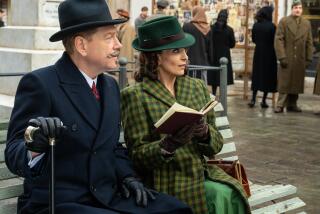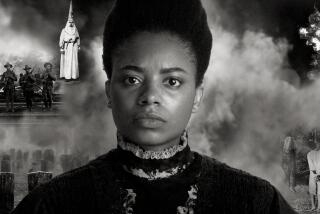A Beguiling, Rich Tale of Imagination
- Share via
Giuseppe Tornatore’s “The Legend of 1900” is a beautiful and venturesome companion piece to the director’s beloved “Cinema Paradiso,” for both are deeply moving affirmations of the power of the imagination.
Adapted by Tornatore, in an assured English-language debut, from Alessandro Baricco’s theatrical monologue “1900,” “Legend” is so unusual that its universal appeal is not nearly as immediate as in the earlier film, which drew upon everyone’s childhood memories of discovering the movies. But as this exquisite fable unfolds, we’re increasingly able to recognize ourselves in Tornatore’s unlikely hero--and Tornatore is able to find in it unexpected meanings--perhaps even more than in “Cinema Paradiso.”
Tantalizingly structured to intrigue us right from the start, it opens with a middle-aged man (Pruitt Taylor Vince), unshaven and clearly down on his luck, entering a used musical instrument shop in what proves to be post-World War II London. Vince’s Max, a jazz musician, has come to sell his trumpet. The shopkeeper (Peter Vaughan) drives a hard bargain, and Max starts to leave but says he must play his cherished instrument one more time. When the shopkeeper hears him, he is inspired to play a jazz record. Shocked at what he hears, Max is moved to tell the shopkeeper an amazing story.
We cut to the year 1900, when a hearty laborer, Danny (Bill Nunn), who shovels coal aboard the ocean liner Virginia, a vessel with the grandeur of the Titanic, discovers an abandoned baby boy nestled in a fruit box. Wanting to spare the infant the orphanages of the day, Danny, with the support of his co-workers, informally adopts the boy, calling him 1900. For eight years, 1900, who officially does not exist, goes undetected by the captain as the Virginia travels between South Hampton and New York and other routes. But then Danny is killed in a shipboard accident, and 1900 escapes deportation by the captain through a virtuoso display of piano playing.
The Virginia sails gracefully into the Roaring ‘20s, its Beaux Arts elegance undiminished, and in 1927, Max and 1900 (Tim Roth) meet when Max joins the ship’s red-hot jazz band. By now, 1900, the band’s star attraction, can play any kind of music dazzlingly well and cuts a dapper figure in white tie and tail. He even takes on Jelly Roll Morton (a spot-on Clarence Williams III), the epitome of proud, cocky splendor as the father of jazz, but he finds the notion of competition abhorrent and pointless. The witty and urbane 1900 has mingled with the likes of Sigmund Freud, Arturo Toscanini and Erich Maria Remarque, yet, as Max learns, much to his astonishment, his new friend has never set foot on land.
Tornatore discovers in 1900 a metaphor rich in meaning, indeed, a metaphor for no less than the human experience. At first, we--and Max--see 1900 as in a state of limbo, a man who has escaped into his art and resists stepping into the muck of everyday life. But 1900 sees the land as a rat race, a place of overwhelmingly infinite choices and perils. The longer 1900 stays aboard, the more intimidating the idea of standing on terra firma becomes.
Ultimately, Tornatore finds a larger meaning in 1900’s predicament: Namely, that while most of us have not experienced so unusually proscribed an existence as 1900 has, it is also obviously impossible for us to experience all of life in all of its aspects. Therefore, we have to rely upon our imagination to understand others as well as ourselves. It is finally impossible also not to see 1900 as a symbol of the individual’s essential solitariness.
As this beguiling, splendid-looking film progresses, moving deftly between past and present, we become charmed by the brilliant 1900 and also by the loyal Max, both men played with flawless persuasiveness by Roth and Vince, respectively. But the Virginia can’t keep on sailing forever, can it? What happens to Max becomes a source of increasing concern and suspense, and “Legend,” gratifyingly, is one film in which the payoff is actually more than equal to the buildup. (You are left wanting to see the original 170-minute version--even if the film was badly received at that length at the Locarno festival.)
Ennio Morricone’s score soars, ranging from jazzy to operatic, and “The Legend of 1900” becomes a particularly apt picture for the millennium’s close. When Max remarks that “nobody is really done for as long as you have a good story to tell and someone to listen,” he’s giving us the very reason why Giuseppe Tornatore is likely to be around for a long time.
* MPAA rating: R, for language. Times guidelines: The film is appropriate for mature older children as well as adults.
(BEGIN TEXT OF INFOBOX / INFOGRAPHIC)
‘The Legend of 1900’
Tim Roth: 1900
Pruitt Taylor Vince: Max
Peter Vaughan: The Shopkeeper
Bill Nunn: Danny Boodman
Clarence Williams III: Jelly Roll Morton
Melanie Thierry: The Girl
A Fine Line Features presentation of a Medusa production. Writer-director Giuseppe Tornatore. Based on the theatrical monologue “1900” by Alessandro Baricco. Producer Francesco Tornatore. Executive producer Laura Fattori. Cinematographer Lajos Koltai. Editor Massimo Quaglia. Costumes Maurizio Millenotti. Production designer Francesco Frigeri. Art director Dominico Sica. Set decorator Brunco Cesari. Running time: 1 hour, 54 minutes.
Exclusively at the Royal, 11523 Santa Monica Blvd., West Los Angeles, (310) 477-5581; Lido, 5459 Via Lido, Newport Beach, (949) 644-0760 or (714) 777-FILM (No. O78); and the Playhouse 7, 673 E. Colorado Blvd., Pasadena, (626) 844-6500.
More to Read
Only good movies
Get the Indie Focus newsletter, Mark Olsen's weekly guide to the world of cinema.
You may occasionally receive promotional content from the Los Angeles Times.










